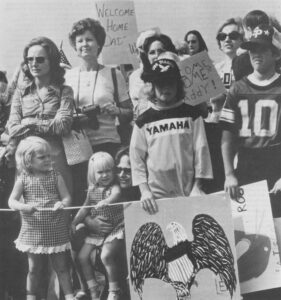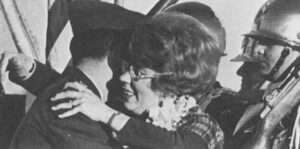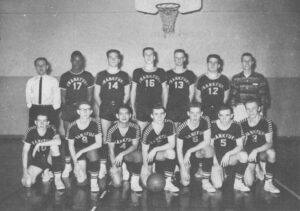(SAN DIEGO)-Jeanne and Walter Simons * retirement house is on a small hill overlooking San Diego. From the picture window that wraps around two walls of their living room, the Simons can look directly out on the Naval installation where Captain Simons was stationed until he retired; to the right is San Diego Bay and the destroyer he once commanded. The Navy, the institution that shaped the Simons’ married life, surrounds them still, though in recent years they have lost the feeling of comfort they once derived from its structured environment.
When Jeanne Simons “married into the Navy,” she was determined to do it right, to turn herself into the gracious “make-do artist” that is the ideal Navy wife. By her lights, this required following her husband wherever he was transferred, even briefly. Each move meant finding new housing (the Simons seldom lived on base), new schools for their children, new dentists, and new friends for all. When her husband was at sea for months at a time, she tried to be both parents to the children; when he became a commanding officer, she added to her duties a heavy schedule of entertaining. And all during those years, Jeanne Simons had a hidden ambition for her husband: “I wanted him to be an admiral!” She is aware that this is no longer a fashionable attitude. “People say, ‘He was the Navy man, not you,’ but I felt it was my career as well as his, and I wanted to play a part in it. A lot of wives have.”
Public Image, Private Hell
Mrs. Simons was not to be one of them. For she began to drink heavily in order to cope with the stresses of Navy life. Instead of helping to advance her husband’s career as she had envisioned, she found that “he would just as soon keep me off to the side as much as possible.” By the time her husband was a senior officer, Jeanne Simons was a full-fledged alcoholic. “You know when you picture the Navy wife, you don’t picture an alcoholic woman. You picture the Navy lady with white gloves on good behavior. And an alcoholic woman, well, she’s just not that much of a lady. She’s a drunk.”
Jeanne Simons is now recovered from her alcoholism, and could easily play the part of the gracious Navy wife. She is a calm, lovely woman with wide blue eyes and delicate coloring. Her slight Southern drawl seems to soften the harshness of her stories of years spent desperately trying to mask her drinking and to function publicly as the perfect Navy wife.
An Institutional Co-Alcoholic
If drinking problems are not part of the idealized image of the military wife, they are often part of the reality. One of the few studies on the subject suggests that military wives drink far more heavily than their civilian counterparts. According to an article summarizing this study, “the rate of alcoholism in the military may be three times greater than in the civilian population. But if the risk is greater for the military man so, too, is it likely to be higher for his spouse.” 1
Although there is increased concern in the Armed Forces over alcohol abuse, comparatively little attention has been paid to the drinking behavior of wives. I talked to Col. Paul Darnauer, a psychiatric social worker in the Defense Department’s Office of Drug and Alcohol Abuse, about military wives’ drinking problems. “All of us in the alcohol treatment area,” he said, “believe in the alcoholic and co-alcoholic.” The co-alcoholic is anyone who has a stake in encouraging the alcoholic to continue drinking. “You could certainly say that by making alcohol such an intrinsic part of military life, the military is an institutional co-alcoholic,” Col. Darnauer said.
Occupational Escape
None of the people I interviewed, recovered alcoholics, their spouses, professional alcoholism counselors blamed military life for directly causing alcoholism. The origins of the disease are complex and not fully understood. Yet there is no doubt that the social structure of the military world provides the predisposed drinker with extravagant opportunity. Military wives seem especially susceptible to the armed forces’ orientation toward alcohol. Jeanne Simons’ husband has concluded that among Navy wives, even more than among Navy men, alcoholism can be considered almost an occupational disease: “Stress is conducive to alcoholism, and boredom and loneliness are conducive to stress. Navy gals get a 100 percent ration of those every day.”
Jeanne Simons remembers vividly how hard it was to adjust to the long stretches of her husband’s sea duty. “I’d be left with the children and the first weeks it would really be rough because that’s when they would test me to see just how much they could get by with while he was gone. Eventually I would get used to setting down the law in the house and then, when Walt would come back, I’d feel like I lost my independence.” The difficulty of shifting roles is mentioned frequently as a special problem in the Navy community. Dr. Frank Dwinnell, who directs the Alcohol Rehabilitation Service of San Diego’s Navy Regional Medical Center, describes a typical pattern: “Here’s a lady who has been fixing the car and tending to everything by herself for nine months and then her husband comes home and wants to be captain of the ship. Well, she can pretend to be a clinging vine for just so long.”
A Sense of Belonging
Some writers have suggested that military wives drink more because of the social pressures of a highly transient way of life. 2 Jeanne Simons has a theory that she goes back to again and again in talking about her troubles with alcohol. Drinking, she believes, provides a short cut to camaraderie and smooth transitions. She recalls the Navy’s customary Hail and Farewell parties, where drinking eased both the pain of parting with old friends and the awkwardness of welcoming newcomers. Whenever she felt like an outsider, she drank to lessen the gap quickly. “It gave me a sense of belonging. I thought, if others are drinking and I’m drinking too, then I must be one of them.”
As her drinking progressed, it became harder for Jeanne Simons to keep up the social front she felt was essential to her role as a Navy wife. Determined not to be “a stumbling-down woman drunk,” she took amphetamines prescribed by a doctor in Newport News, refilling the prescription continually as she and her family moved up and down the East coast. By then, she had admitted to herself that she was in trouble, but, as is the experience of many alcoholics, she couldn’t find anyone to diagnose her problem. Wherever she and her family were stationed, “I would quietly go to some clinic trying to find out what was wrong with me. Nobody would say, ‘you’re an alcoholic and this is what you do about it;’ they just shunted me from here to there.” She told one doctor at Bethesda Naval Hospital that she was afraid she was drinking too much, more than she considered normal. His reply was, “Well, everybody drinks too much.” Because of the stigma attached, she never confided in other Navy wives. (Years later, when she ran into an old friend who was a Navy wife at an Alcoholics Anonymous meeting, the woman at first tried to hide from her.)
After several years of unsuccessfully seeking help, Jeanne Simons ended up in the psychiatric ward of Bethesda Naval Hospital with hallucinations. Again, her major concern was her husband’s career. He was under consideration for early promotion to Captain, and she worried that her hospitalization would damage his chances. It did not, yet today she feels fairly sure that her alcoholism cost her husband his next promotion, the one that would have elevated him to the rank of Admiral. “After all,” she says, “I was not one of those antagonistic wives who tried to get her husband to leave the Navy. I was all for the whole thing.”
Jeanne Simons is no longer all-out for the Navy. She and her husband feel a lingering bitterness over what they regard as the Navy’s negligent attitude toward her problems. “The Navy just had no help for the dependent wife,” Jeanne Simons says, 14 not to my knowledge. In fact, I would say they just didn’t because I was there looking. It wasn’t a matter of my not asking for help, because I did. I just was not receiving it.”
The Final Straw
The rebuff that angered Jeanne Simons most was being turned away from the Navy’s famous Rehabilitation Center at Long Beach, California, where Betty Ford and Billy Carter were treated. She presented herself there in desperation, after a relapse of drinking. She never got near the ward: the nurse on duty in the emergency room informed her that the rehabilitation program was restricted to active duty personnel and celebrities. For Jeanne Simons, the nurse’s pronouncement was the final straw. By her own account, she “went into a tirade. I said, ‘Look, I’m a Navy wife. I’ve had this problem a long time and the Navy has never seen fit to help me with it.’ I said, ‘It’s a big problem in the Navy; I know of wives who have committed suicide because they were alcoholics.’ I said, ‘I think it’s a disgrace that the Navy wife does not get the proper help. After all, we’re as much a part of the Navy team as the Navy man.”‘
Jeanne Simons’ anger and confusion at not being treated as a teammate are understandable. Where military wives are concerned, policy and rhetoric frequently are at odds. “The Navy Wife-It’s the toughest job in the Navy.” is the headline of a Navy reenlistment ad in a magazine for service wives. Yet when it comes to concrete policy, the needs of wives have been the last to be met. When I asked Col. Darnauer about the military’s attitude toward wives, he reminded me of an old saying familiar to anyone who has spent time around the military: “If Uncle Sam had wanted you to have a wife, he would have issued you one.” “We can laugh about it,” Darnauer says, “but in fact that philosophy still plays through the services.”
The Bosun’s Mate’s Wife
Most of the money spent on alcohol treatment has been directed at keeping active personnel on the job working. To the extent that wives have been served, says Col. Darnauer, “…it is by focusing on the effect they have on the active duty individual.” Or, as Dr. Dwinnell puts it, “The Navy has realized that if you treat the Bosun’s Mate, he’ll be a better Bosun’s Mate, so it’s not such a big jump to say, ‘Treat the Bosun’s Mate’s wife and he’ll be a better Bosun’s Mate.'”
Dwinnell would like to see the Navy take on more responsibility for treating wives. In most military alcohol rehabilitation centers, dependent spouses can be treated only on a space available basis. When beds are not available-which they rarely are-wives are referred to local civilian facilities. In the majority of cases, the military will pay 80 percent of the cost for such treatment; 75 percent for wives of retired military men. But, as Jeanne and Walter Simons point out, the military centers are often superior to civilian ones, and even 25 percent of the cost can become exorbitant on retirement pay.
Admittedly, the situation has improved somewhat in the years since Jeanne Simons searched unsuccessfully for help. All branches of the military now provide some form of outpatient counseling which alcoholic wives may take advantage of. And there is reason to hope that the military services will soon address the problems of alcoholic dependents more directly. In 1978 a White House review of Defense Department alcohol abuse programs found that programs for dependents were inadequate. The review panel recommended that the Defense Department assess the problem among dependents and develop special programs to meet their needs. As a result, the Defense Department’s Office of Drug and Alcohol Abuse is in the process of revising its directive-last updated in 1972-setting policy on alcohol abuse.
The situation should improve still further with the revision of the directive, which is scheduled to be released in a few months, and which mentions dependents explicitly for the first time. It gives the Armed Services the mandate-though not the resources-to develop programs for alcoholic dependents that are consistent with those for active duty personnel.
None of the new Defense Department policies, however, will resolve the basic contradiction that troubles Jeanne Simons and other military wives. Alcohol rehabilitation programs encourage problem drinkers to take responsibility for their own lives, to become less dependent. Yet that word dependent both names military wives and characterizes their condition. “Being a dependent isn’t just a matter of terminology,” says Jeanne Simons. “I finally realized how tied up I was in the whole thing: you shop at the Navy exchange, you see Navy doctors. Many of your decisions are made for you. The dependency can be comforting, but it’s at the cost of your ability to function.”
Endnotes
- Gerald R. Garett, et. al; “Drinking and the Military Wife: A Study of Married Women in Overseas Base Communities;” in Military Families; Adaptation to Change; eds. Edna J. Hunter and D. Stephen Nice; (New York, 1978).
- Ibid
ANN BANKS is studying the Military Family on her APF fellowship.




